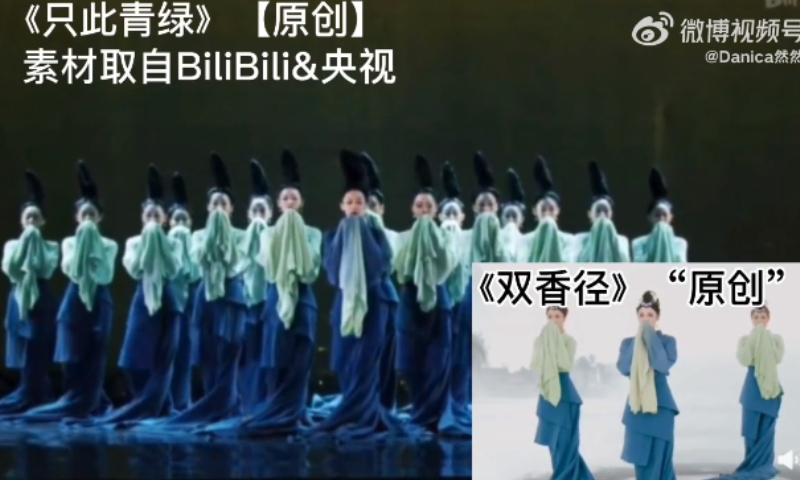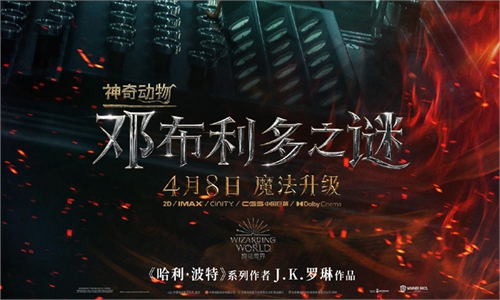ARTS / DANCE
Chinese dance show suspected of plagiarism, raises concerns about copyright protection

Screenshot of the dance show Poetic Dance: The Journey of a Legendary Landscape Painting (Insert: the show airing on Zhejiang TV Station) Photo: Weibo
Following the plagiarism scandal of Audi's advertisement, chief directors and producers of a hit Chinese dance show called Poetic Dance: The Journey of a Legendary Landscape Painting accused another show airing on Zhejiang TV Station of plagiarism, sparking a discussion on how to effectively protect the copyrights of original cultural works.
Zhou Liya and Han Zhen, chief directors and producers of the Poetic Dance show, were informed by friends on Sunday of another dance show that looks similar to their production. After checking the video of the show, Zhou and Han confirmed with The Paper that "the dance is more than 90 percent similar to our work in clothing and movement."
The video of the dance show published on Zhejiang TV Station's account was fist labeled as "original" and after Zhou and other netizens pointed out the plagiarism the label disappeared.
Zhou said that she wrote a comment under the video as soon as she was informed but her comment was then deleted and the comment function of the post was closed.
The production team of the controversial dance show apologized to Zhou and Han in a statement published on Sina Weibo on Tuesday and said that the controversial work has been cancelled.
The dance show Poetic Dance: The Journey of a Legendary Landscape Painting is inspired by a well-known painting of Song Dynasty (960-1279), A Panorama of Rivers and Mountains, created by painter Wang Ximeng when he was 18 years old.
The Palace Museum also contributed to the production of the dance show, which debuted at the National Center for Performing Arts in August 2021. After the show was launched on the stage of the 2022 Spring Festival Gala it became popular around the country.
Some netizens published screenshots of the show and the one aired by Zhejiang TV Station, saying that the photos show that the dresses and some movements of the dancers do seem similar.
A jazz dancer based in Beijing told the Global Times that creators of dance works usually learn from each other but too similar movements and music beats are signs of plagiarism and are not allowed.
"Such behavior should be seriously punished," netizens supported Zhou and Han, calling for the punishment of plagiarism to crack down on such behavior in the cultural industry.
Some netizens pointed out that this plagiarism did not happen once in the industry, so more effective measures are urgently needed. Experts also agreed with the opinion.
"Plagiarism is common in the field of creation and the root cause is that it is difficult to fight for legal rights while the cost of plagiarism is low," Fan Zhihui, analyst of the music industry, told the Global Times on Monday. He suggested increasing the cost of plagiarism, including heavier punishment from the law and higher financial compensation.
"This in fact shows the appreciation from the public about those related issues, which is a good thing, as well as a symbolic moment," Xiong Bingqi, deputy director of the Shanghai-based 21st Century Education Research Institute, told the Global Times on Monday.
The public outcry for attention on plagiarism and the protection of authors and creators have occurred for the past years as similar issues happen from time to time, especially under circumstances involving new media.
"Plagiarism happens very often in the internet era. For example, some video and media bloggers use articles published by other bloggers, or some video bloggers plagiarize their counterparts' shooting techniques and dialogues, but did not quote the author and source. Most of those situations happen without being held legally responsible," added Xiong.
In that case, the creators should bravely stand up and confront the plagiarists, said Xiong, but if the negotiation fails, the creators have every right to file a lawsuit.
In addition, with the improvement of people's awareness of copyright, the heating discussion of similar public events can also play a role in social surveillance.
"In those plagiarism cases, we should pursue the responsible plagiarist and also pay more attention to the problem itself. To combat plagiarism and protect originality, it is also worth trying to set up a public welfare fund against plagiarism and protection of the creators," noted Xiong.


